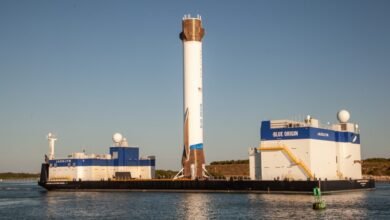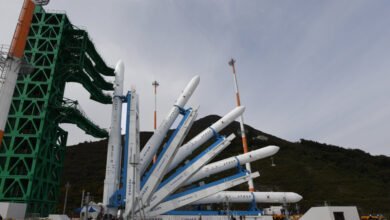China’s Falcon 9-Style Rocket Tested as NASA’s Moon Rocket Completes Stacking

▼ Summary
– The 10th anniversary of SpaceX’s first Falcon 9 landing is approaching, with Blue Origin and LandSpace potentially joining them in orbital booster landings next month.
– Blue Origin is preparing for its second New Glenn rocket launch, while LandSpace is preparing for the debut flight of its Zhuque-3 rocket, both attempting downrange booster landings.
– Apex, a startup, plans to test a space-based interceptor in 2026 using low-cost satellites equipped with multiple interceptors from a third-party partner.
– Traditional defense contractors Northrop Grumman and Lockheed Martin are also developing space-based interceptors, with Lockheed targeting an orbital test by 2028.
– The Rocket Report includes updates on various rocket classes and upcoming launches, inviting reader submissions and subscriptions for regular issues.
The global space industry is witnessing a pivotal moment as China’s LandSpace prepares for the inaugural flight of its Zhuque-3 rocket, designed to perform a Falcon 9-style vertical landing. This development coincides with Blue Origin’s upcoming second New Glenn mission, with both companies aiming to join SpaceX’s exclusive club of recovering orbital-class boosters through propulsive landings. While not a direct competition, the simultaneous progress highlights a significant shift toward reusable launch technology. Observers are keenly watching to see how these new rockets manage the complex ascent and descent phases, and whether their first stages can achieve a successful touchdown.
We encourage our readers to contribute news and updates. To ensure you receive every edition, subscribe using the form provided below. Please note that this feature may not be accessible on AMP-enabled pages. Our comprehensive reports cover developments across small, medium, and heavy-lift launch vehicles, along with a preview of the next three scheduled launches.
A new frontier in missile defense is emerging as private firms and established contractors accelerate work on space-based interceptors. Recent policy announcements have spurred several U.S. companies to independently fund and develop orbital weapons systems. A notable example is startup Apex, which unveiled plans to test a space-based interceptor as early as next year. Their approach involves a low-cost satellite platform equipped with an “Orbital Magazine” holding multiple interceptors, sourced from an undisclosed partner. A demonstration mission in low-Earth orbit, potentially launching by June 2026, will test-fire two interceptors from Apex’s Project Shadow spacecraft. This initiative could lead to operational systems capable of neutralizing ballistic missiles from space.
Major defense contractors are also advancing their own programs in this domain. Northrop Grumman’s CEO Kathy Warden confirmed earlier this year that her company is already conducting ground tests of space-based interceptor components. Meanwhile, Lockheed Martin announced its roadmap to conduct an orbital test of a space-based interceptor by 2028. While these established players have been more reserved about technical specifics, their parallel efforts signal a broad industry movement toward deploying defensive assets in space.
(Source: Ars Technica)







